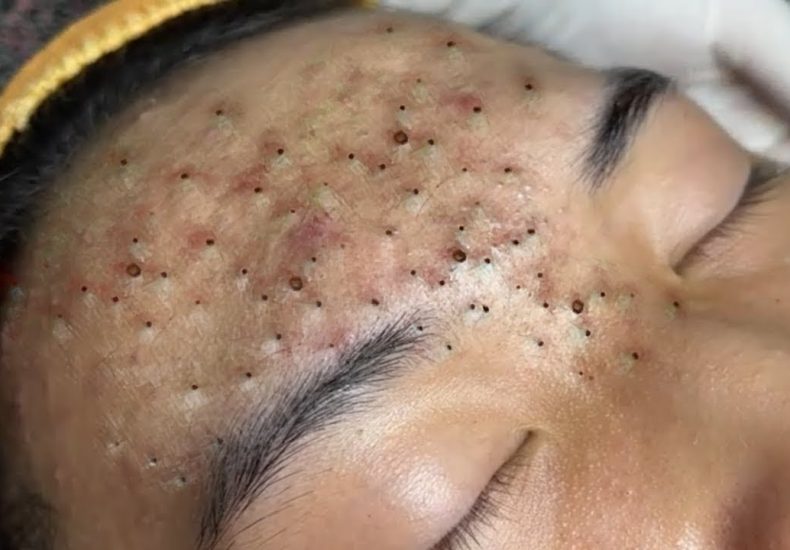
Doctor reacts to super satisfying pimple
Doctor reacts to super satisfying pimple
Click the link to watch the video.👇👇
When a doctor—especially a dermatologist—sees a super satisfying pimple pop, their reaction depends on their experience and mindset:
👨⚕️ A Dermatologist’s Reaction:
-
Professional detachment: They’re trained to handle skin conditions daily, so a big, satisfying pimple is just another routine extraction.
-
Clinical curiosity: They may mentally assess it—Is it a cyst? Is it inflamed? Should it be lanced or drained differently?
-
Mild satisfaction: Many dermatologists do find extractions oddly satisfying in a clinical way, especially if it goes smoothly with minimal trauma to the skin.
👨🏫 If They’re Teaching:
-
Might use it as a teachable moment: “This is a classic example of a closed comedone,” etc.
🤢 Non-dermatologist Medical Staff:
-
Might cringe, laugh, or look away—but they’ve still seen worse.
In contrast to viral videos where viewers react with fascination or disgust, doctors often view these moments with calm efficiency—clean technique, full expression, and proper wound care are what matter most.
Would you like a humorous take on it, or the medical steps they’d follow during a real extraction?


When a dermatologist encounters a particularly satisfying pimple extraction, their reaction is typically a blend of clinical focus and professional satisfaction. Here’s an in-depth look at how dermatologists approach such scenarios, supported by expert insights:
🩺 Professional Perspective: Clinical Focus and Satisfaction
Dermatologists are trained to handle various skin conditions, including acne, with a methodical approach. While they might find the successful extraction of a pimple gratifying, their primary concern is ensuring the procedure is performed safely and effectively. This involves minimizing potential complications such as infection, scarring, or worsening of the condition.
🧪 Dermatologist-Performed Extractions: Procedure and Rationale
Dermatologists utilize sterile instruments and techniques to extract certain types of acne lesions, particularly comedonal acne like blackheads and whiteheads. This process, known as acne extraction, is typically reserved for cases where other treatments have not been effective. The procedure involves:
-
Sterilization: Ensuring all tools and the skin area are properly sterilized to prevent infection.
-
Assessment: Determining which lesions are suitable for extraction.
-
Extraction: Using specialized tools to remove the contents of the acne lesion without causing damage to the surrounding skin.
-
Aftercare: Applying appropriate treatments post-extraction to promote healing and prevent scarring.
It’s important to note that not all acne types are suitable for extraction. For instance, cystic acne, which involves deeper, inflamed lesions, may require alternative treatments such as corticosteroid injections or incision and drainage performed by a professional .
⚠️ Risks of At-Home Pimple Popping
Dermatologists strongly advise against self-extraction of pimples due to the risks involved:
-
Infection: Non-sterile techniques can introduce bacteria, leading to infections.
-
Scarring: Improper extraction can damage the skin, resulting in permanent scars.
-
Worsening Acne: Squeezing pimples can push contents deeper into the skin, exacerbating inflammation and leading to more severe breakouts .
If a pimple is particularly bothersome, it’s best to consult a dermatologist who can assess and treat it appropriately.
👩⚕️ Expert Insight: Dr. Sandra Lee (Dr. Pimple Popper)
Dr. Sandra Lee, widely known as Dr. Pimple Popper, emphasizes the importance of professional evaluation for severe or persistent acne. She advises that while over-the-counter treatments can be effective for mild cases, more significant issues should be addressed by a dermatologist to prevent complications .
✅ Conclusion
In summary, while dermatologists may find the successful extraction of a pimple satisfying, their approach is rooted in clinical expertise aimed at ensuring patient safety and optimal skin health. They prioritize sterile techniques, proper assessment, and appropriate aftercare to manage acne effectively. For individuals dealing with persistent or severe acne, seeking professional dermatological care is the recommended course of action.
If you’re interested in learning more about professional acne treatments or have specific questions about skin care, feel free to ask!
🧑⚕️ Clinical Perspective on Pimple Extractions
Dermatologists are trained to handle various skin conditions, including acne lesions, with precision and care. Their reactions are rooted in their medical training and the importance of patient safety.
✅ Professional Satisfaction
-
Effective Treatment: A successful extraction can provide immediate relief to the patient and is a visible sign of effective treatment.
-
Educational Value: Such cases can serve as teaching moments for trainees or for patient education.
⚠️ Clinical Caution
-
Risk of Scarring: Improper extraction techniques can lead to scarring or skin damage.
-
Infection Control: Maintaining a sterile environment is crucial to prevent infections during and after the procedure.
🧪 Standard Procedure for Pimple Extraction
Dermatologists follow a structured protocol to ensure safe and effective extractions:
-
Skin Preparation: The area is cleansed and may be exfoliated to remove dead skin cells.
-
Sterilization: Tools such as comedone extractors or sterile needles are used.
-
Extraction: Gentle pressure is applied to remove the contents of the lesion.
-
Post-Extraction Care: The area is cleansed again, and an antimicrobial agent may be applied to prevent infection.
📺 Dermatologists Reacting to Extractions
Some dermatologists share their reactions to pimple extraction videos, providing professional insights:
-
Dr. Pimple Popper (Dr. Sandra Lee): Known for her educational videos on various skin procedures.
-
DermAngelo on TikTok: Offers professional commentary on extraction videos, highlighting proper techniques and cautioning against common mistakes.
🧴 Advice for At-Home Care
While it might be tempting to perform extractions at home, dermatologists advise caution:
-
Avoid DIY Extractions: Improper techniques can lead to complications.
-
Consult a Professional: For persistent or severe acne, seeking professional care ensures safe and effective treatment.
-
Use Appropriate Products: Over-the-counter treatments containing benzoyl peroxide or salicylic acid can be effective for mild acne.
In summary, while a “super satisfying” pimple extraction might elicit a visceral reaction from the general public, dermatologists approach it with a focus on patient safety, effective treatment, and clinical outcomes.
Leave a Reply